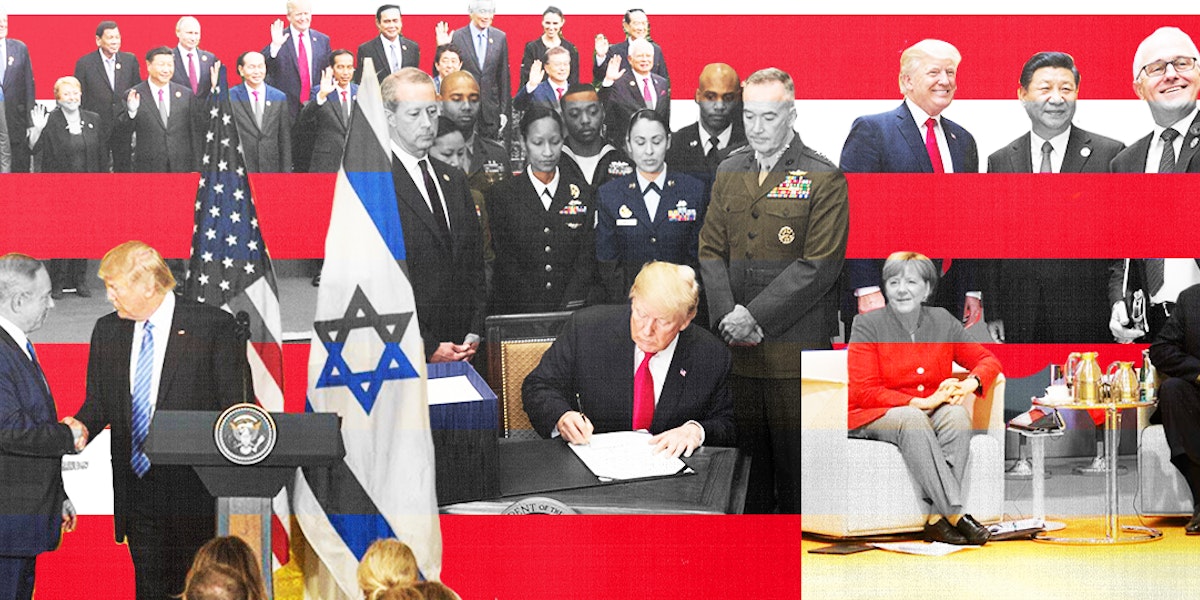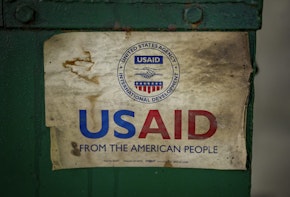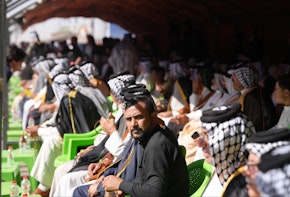Donald J. Trump has spared none of the sacred cows of American foreign policy during his first year in the White House, even if his sometimes radical rhetoric hasn’t always translated into major policy shifts.
Meanwhile, the world order itself has reached a hinge point, as rising powers such as China and Russia jostle to supplant American leadership. Trump seems to agree in principle that America ought to walk away from its historic role as global arbiter.
Fortunately, no Pearl Harbor or 9/11 has tested America’s latest flirtation with isolationism, at least not yet; there are, however, warning signs aplenty of possible cataclysms, such as another financial crisis, nuclear escalation, or regional war.
Old rules and institutions are under threat, with few clues as to what might take their place. In order to begin assessing a presidency with little historical precedent, we asked TCF’s foreign policy experts and contributors to each choose the single most significant impact Trump’s presidency has had so far on the world and on America’s standing in it. Some raised specific concerns about crises in North Korea and Iran; others saw the greatest impact in Trump’s style of policy-making and diplomacy; and some saw broader trends reshaping American influence in the world, which predate Trump even if his presidency accelerates them.
What should we make of an American president who derides the international liberal order designed to prevent a third world war, and which benefited the United States more than any other power?
Undermining a good Iran deal
Dalia Dassa Kaye, The RAND Corporation
President Trump’s decertification of the Iran nuclear deal—a deal seen as a success by all of its parties and endorsed unanimously by the UN Security Council—has my vote for having the biggest impact on the Middle East this year, and possibly since the invasion of Iraq in 2003.
If the administration follows through with its threats and refuses to waive nuclear-related sanctions as the deal requires, the decision could undermine regional stability and isolate the United States globally. The International Atomic Energy Agency has verified Iranian compliance, so the United States would be in violation of the agreement and be blamed for its breakdown. Europe might be willing to spark a trans-Atlantic crisis if it believes that renewed U.S. secondary sanctions threaten European investment in Iran. In turn, Iran may no longer see the economic benefits of the deal in such a volatile environment—even if Europe tries to salvage the agreement—and return to pre-deal levels of nuclear development.
Just like before the deal, the international community would be facing the unappealing options of living with a nuclear Iran or considering military options. This crisis of choice was unnecessary and without obvious strategic logic, as the agreement in hand verifiably prevents a nuclear-armed Iran for the foreseeable future.
Limited team, impetuous leader
Bruce W. Jentleson, Duke University
Much has been made of the “team of generals”’s potential moderating effect on Trump. But while Defense Secretary Jim Mattis, National Security Advisor H. R. McMaster, and White House Chief of Staff John Kelly all are policy professionals, their principal formative experiences have been largely in the counterterrorism, asymmetric conflict, and stabilization operations of the Iraq and Afghanistan conflicts. There really is no one on the senior team, including Secretary of State Rex Tillerson, with significant experience and expertise in overall global and multi-dimensional strategic diplomacy.
Major U.S. foreign policy failures (e.g., Bay of Pigs 1961, Iraq War 2003) have resulted from presidents who have been insufficiently deliberative, paid little attention to analytic assessments, and operated largely on political calculations and ideological inclinations. Absent a corrective rudder, Trump’s temperament and impetuous decision-making style present a danger to the country and the world.
Putting China in charge
Richard Gowan, European Council on Foreign Relations
Donald Trump stirred up a lot of trouble at the United Nations in 2017, and the net beneficiary was China.
Trump’s emissary to the UN, Nikki Haley, has been relatively pragmatic. But the president has harmed America’s global standing by announcing its withdrawal from the Paris climate deal, questioning the Iran nuclear bargaining, quitting UNESCO, and refusing to participate in UN talks on migration. Conversely, Beijing seems keen to continue UN processes on issues ranging from global warming to North Korea.
It is not clear that China wants to replace the United States as the UN’s biggest power. Its representatives are generally less boorishly assertive than their Russian counterparts, although they can be blunt when their immediate interests are at stake. But diplomats from smaller countries, including some long-standing U.S. allies, believe that the balance of power in multilateral affairs will continue to tip in Beijing’s direction.
This trend has downsides. For instance, China placed strict limits on UN engagement in the Rohingya crisis in Myanmar this year. But in the absence of U.S. leadership, foreign diplomats are now instinctively looking for alternative guarantors of the global system. Beijing hardly has to make any effort to look like the leader-in-waiting.
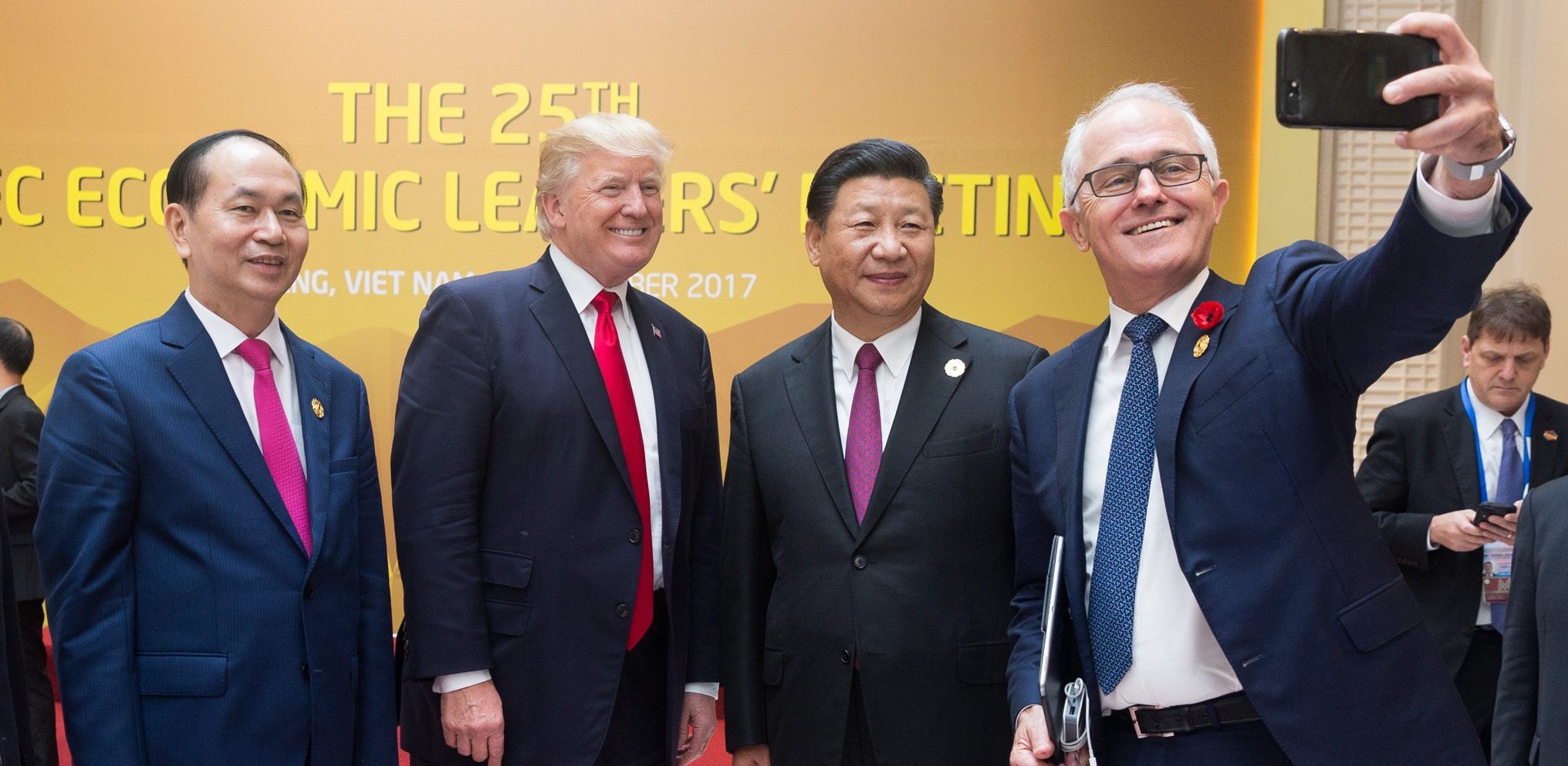
Trust gap will outlive Trump
Michael Wahid Hanna, The Century Foundation
U.S. stewardship of the international order has been undermined in the years since 9/11. Those setbacks are the result of morally and strategically calamitous foreign policy choices that exacerbated existing global challenges and reckless financial risk-taking that plunged the world economy into crisis. America’s closest allies were rightfully wary of U.S. primacy and leadership, but still held out hope for self-correction. Those concerns form the backdrop for today’s weakening international order, and its decreased capacity to deal with the increasing variety of threats and challenges.
But trust in U.S. leadership has likely never been weaker following the ascension of Donald Trump to the presidency. That weakening trust is not simply a result of Trump’s unparalleled unfitness for his office, but an understandable worry about the collective capacity of U.S. society to rationally self-govern. People have often referred to the collective wisdom of the American people as the ultimate guardrail for U.S. democracy. However, the increasingly irrational and shrill tenor of American political discourse will give pause to those who placed their trust in alliance and friendship with the United States and hope to again do so. Even following the eventual correction to come, the fact of Trump and his election will be enough to inject uncertainty about the United States, its reliability, and its wisdom.
Liberal democracy withering away
Aron Lund, The Century Foundation
I don’t know that Donald Trump has changed the world much yet, but he’s certainly a harbinger of change to come.
Thrashing about in Washington, he’s made all sorts of global ripples. A few decisions will leave lasting scars, such as pulling out of the Paris Agreement. But if you’re asking about the single biggest thing about his presidency, then I think we’re looking at a broader, deeper shift. It has to do with how people across the world relate to the United States, and to the future of American democracy.
Trump won an election by taking none of its accepted rules seriously, demonstrating that the norms on which the U.S. political system always rested have lost their purchase with much of the public. Trump is prima facie evidence that the United States is changing into something new and unknown.
It’s not just the United States, of course. The institutions, social structures, and constituencies that have sustained liberal democracy (as well as several species of authoritarian rule) are withering away in a world redefined by transformative globalization, self-segregating virtual polities, and instant communications.
Trump, to his great credit, gave early warning.
Sound but no fury (so far)
Rasha Al Aqeedi, Al Mesbar Studies and Research Center
Donald Trump’s cyclonic first year in office brought change to America, but less so to the rest of the world. The liberal world order has been challenged, but has—so far—managed to hold together in its most important functions.
In American politics, Trump has introduced a possibility that might seem better-suited for dystopian fiction: a first-world autocracy that rejects freedom of the press and portrays criticism of leaders as a witch hunt or conspiracy. On the global stage, however—despite outrageous statements, positions, and the introduction of the Presidential tweet in Trump’s first year—America’s basic alliances with European capitals have not been questioned. Trump’s incoherence on issues such as global trade, China, NATO, the Iran nuclear deal, and U.S. foreign intervention has manifested in little to no tangible change. Anger toward the U.S. president is more evident among foreign political elites than among heads of state, who are accustomed to managing relationships with powerful and sometimes unconventional U.S. presidents. Outrageous tweets have provoked statements, press releases, and even colorful off-the-cuff comments—but for the most part, they haven’t provoked drastic policy shifts.
New methods, old dead ends
Nathan J. Brown, The George Washington University
Trump has brought no new ideas to U.S. policy in the Middle East. Long-term trends in the region—American decline, the rise of Iran, outbreaks of intra-state violence—have tied U.S. hands. Trump’s actual policies differ very little from those that were followed by his two predecessors.
Yes, he may strike out in some new direction on Iran. And his Jerusalem declaration upended years of careful U.S. posturing on the issue. But even on those two matters he has propounded views that had been well-heard within the foreign policy establishment. What’s new is the rhetoric—explicitly Islamophobic and highly partisan in nature. And that new rhetoric comes along with new means—or rather, the discarding of old ones, like the use of the America’s diplomatic corps and web of alliances. The U.S. has always insisted on leading diplomatic efforts in the region.
Trump seems almost deliberately opposed to diplomacy, leaving that field to others. At most, he has dedicated himself to building a few bilateral relationships with leaders he considers strong. These new features grab attention, but they mask the fact that they cannot address (and indeed may even exacerbate) the long-term trends to which they purportedly respond.
Headache for Western allies
Michael Stephens, Royal United Services Institute
From the perspective of an outsider from the United Kingdom, the single biggest impact of the Trump presidency has been to shake the foundations of belief in American global leadership. While one year into his presidency there is little that can be called a “Trump” doctrine, his statements and sometimes his policies have alienated allies, stoked tensions with enemies, and left question marks about America’s intentions in the world.
To put it bluntly, this is a headache for Western allies, whose own foreign policy postures rely heavily on understanding U.S. policy priorities and reacting accordingly. The United States has maintained its security presence in the Middle East and Europe; escalated its presence in the Far East; and successfully committed to degrading ISIS—policies which to a large extent have been positive. But mixed signals from the administration leave these commitments in doubt.
If 2018 continues in the same vein as 2017, then it is only a matter of time before cracks will appear in the West between Washington and its NATO allies. Much can be forgiven if the administration makes firm commitments to strengthening NATO, and doubles down on working in concert with its partners, but the repairs have to begin now to prevent potentially irreparable damage to America’s alliances.
Accelerating decline
Laura Dean, writer
For decades, U.S. power has been declining in the world. Trump’s presidency hasn’t fundamentally changed this dynamic, but it has sped it up, on issues from the environment to refugee policy to international trade. As the United States retreats from its historical leadership role in the world, countries such as China, Germany, France, and others have more forcefully stepped into positions of power and influence.
Domestically, his presidency has prompted groups other than the federal government, from city halls to Silicon Valley, to take on leadership roles on a range of issues. The long-term effects of the creation of these new domestic centers of power remain to be seen, but internationally it is likely to usher in the decline of American empire sooner than predicted, perhaps creating a more multipolar world.
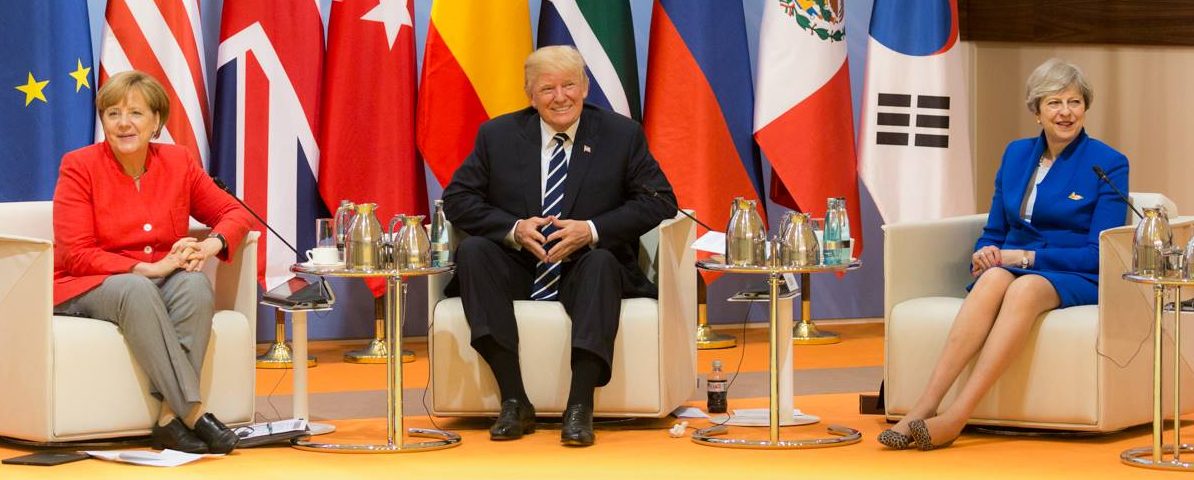
Reviving nuclear fear
Selim Can Sazak, Brown University
The Trump administration’s dismantling of American foreign policy has given us much to worry about, but one trend is particularly pernicious: the erosion of the nuclear taboo, which makes escalation to nuclear war likelier than ever.
Since the atomic bombings of Hiroshima and Nagasaki, conventional wisdom has held that the human cost of nuclear weapons puts their use beyond the pale. But researchers have found evidence that risk-averse public opinion has shifted, and might even support the use of nuclear weapons “in the crucible of war.” That’s not exactly a comforting thought when nearly ten thousand such weapons could be launched by President Trump’s button.
Gone is the optimism of President Obama’s 2009 Prague speech, which promised a nuclear-free future. Today, nuclear buildups not only in the U.S. but also in Russia and China threaten to revive a Cold War-era arms race, and brinkmanship over North Korea has reached worrying levels. The Trump team also seems intent on reversing President Obama’s hard-earned deal with Iran, assuredly enabling Tehran’s nuclear ramp-up and potentially provoking others, like Saudi Arabia, down the same path. The likely outcome? A war between Iran and its regional rivals, including the region’s only nuclear-armed country, Israel.
North Korean Leader Kim Jong Un just stated that the “Nuclear Button is on his desk at all times.” Will someone from his depleted and food starved regime please inform him that I too have a Nuclear Button, but it is a much bigger & more powerful one than his, and my Button works!
— Donald J. Trump (@realDonaldTrump) January 3, 2018
The nuclear nonproliferation regime is also rapidly unraveling. The Nuclear Weapons Ban Treaty, which won its campaigners the Nobel Peace Prize, was a product of the international community’s frustration that nuclear-weapon states, including America, shirked their commitment to disarm despite existing arms control agreements. The Nobel Prize was partly a message encouraging Washington to renew its commitment to arms control. President Trump, however, seems like he would rather go down the path to a nuclear confrontation than relinquish any power to diplomacy.
Immigrants, Muslims not welcome
Lily Hindy, The Century Foundation
Of Donald Trump’s many troubling policies, I believe the most lasting impact will come from his rhetoric and action on immigration. President Obama was derided as “deporter-in-chief,” but Trump’s travel bans on Muslim-majority nations (plus the two non-Muslim but apparently equally dangerous countries he threw in for good measure) were unprecedented. Trump’s nativist turn threatens America’s historic legacy as a destination for opportunity-seekers worldwide.
His administration set a historically low cap on refugee admissions for the coming year despite increasing numbers of people fleeing violence across the world. Trump and his appointees claim they’re trying to process a backlog of asylum cases in the United States, but in many public comments have made clear their distaste for refugees, whom they consider an economic and security threat.
As for undocumented immigrants already inside the country, Trump has stepped up arrests, cancelled the Deferred Action for Childhood Arrivals (DACA) program, and ended the Temporary Protected Status designation for nationals of certain countries embroiled in violent conflict or suffering from the aftereffects of a natural disaster.
Though the courts have successfully blocked some of Trump’s attempts, the administration has persisted. We are likely to see more anti-immigration moves in coming years. This widespread rejection of people wishing to enter our country—tourists, students, business people, those fleeing violence or persecution—is sure to hurt America’s own interests abroad. It will also hurt America at home. Keeping out immigrants and visitors will corrode the formula that really did make America great.
Risks of war
David Griffiths, independent researcher
Sadly, the Trump administration is transforming the United States from an imperfect but generally responsible global citizen into a lumbering wildcard in need of management. Under the new administration’s policies, friendly democracies and advanced economies striving to build a cleaner, safer, more prosperous world are treated as lesser competitors to America. Meanwhile, America puts itself first in what the Trump administration’s new National Security Strategy describes as an “extraordinarily dangerous” and “competitive world.”
The progress of democracy everywhere is undermined as dictators and autocrats from Egypt to Saudi Arabia to Russia to the Philippines point to American regress as an illustration of the inherent flaw in the democratic ideal: that ill-qualified “masses” are too-easily seduced by flamboyant but unqualified celebrities, and therefore liable to entrust the ship of state to captains who may be intellectually, morally, and temperamentally unfit for office.
Coherent policy-making by U.S. allies and rivals alike is increasingly hostage to impulsive and poorly informed decision making, both individual and institutional. This administration’s nineteenth-century, zero-sum worldview of hegemonic powers, competing alliances, spheres of influence, and military bluster should be worrying. It doesn’t take a professional historian to recognize how well that worked out after an obscure terrorist incident in Sarajevo in 1914.
World needs new leaders
Sam Heller, The Century Foundation
I’ll frame this optimistically: I think Trump is probably helping countries around the world, and traditional U.S. allies specifically, to recognize the importance of their own independence and self-reliance.
Of course, that’s because it’s increasingly apparent that they can’t depend on a U.S.-led global order. The sunset of American unipolar dominance was probably coming at some point. But now that it’s clear to everyone that—thanks to domestic U.S. electoral politics—U.S. power worldwide is periodically at the command of someone like President Trump, that sunset seems like it’s coming much faster.
Trump has personally been a force for chaos in world affairs. But even below the president himself, the U.S. foreign policy apparatus doesn’t seem like it’s compensating. I’ve heard repeatedly from U.S. allies who are alarmed to be dealing with a non-unitary executive, a government whose officials tell them irreconcilably different things about America’s positions. And even where policy has sort-of come together, the result has been internally incoherent, with aggressive ends basically unrelated to available means.
These are not wholly new features of U.S. foreign policy. But, like Trump has done with the ills and divisions within American culture, he has cast these problems endemic to U.S. policy abroad in sharp relief. It’s now impossible for other countries in the world to ignore those problems, and that means they have to think seriously about how to fend for themselves—without America.
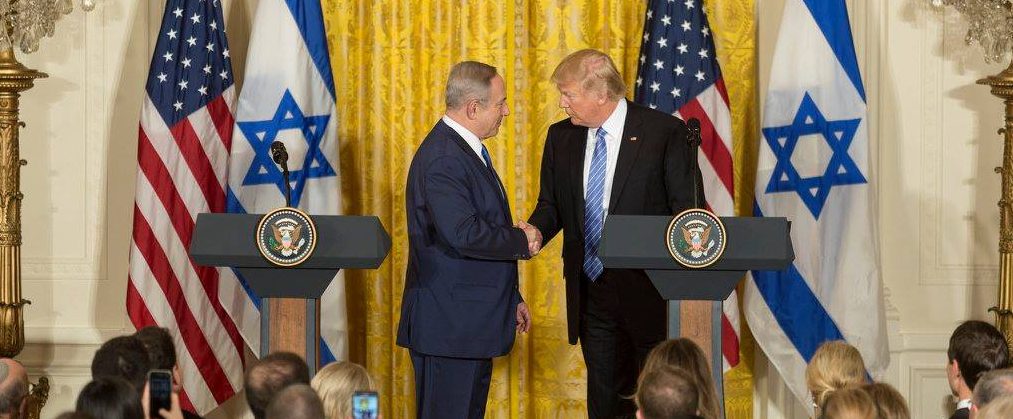
America first, America alone
Brian Katulis, Center for American Progress
President Donald Trump has ushered in a new, unprecedented era of American retrenchment from the world. Through both words and deeds, Trump has abandoned America’s leadership role on the central issues that will reshape the world in the twenty-first century.
Beneath the thin cover of Trump’s “America First” slogan and bombastic rhetoric is a formula for America’s retreat on the global economy, climate change, migration, conflict resolution, championing freedom and human rights, and defeating extremist ideologies.
Countries around the world have already adjusted to an America that has grown more passive and less relevant under Trump. China has filled the gap left behind by America’s withdrawal from economic leadership in Asia and beyond. Russia proceeds apace in their efforts to meddle undeterred in open, democratic societies. Middle East regional powers such as Saudi Arabia and Iran continue to test the limits of their power, with destructive effects, mostly unhindered by outside powers.
President Trump’s domestic policies further buttress and encourage the country’s international retrenchment. His divisive economic and social agenda will continue to draw America’s political debate further inward in the years ahead. And as the Baby Boomer generation retires, the strains on America’s social safety net will increase and the electorate’s overall appetite to remain engaged in the world will likely decrease even further as a result. “America First” means America alone, and the world will continue to move on without it.
Another strongman
Sima Ghaddar, The Century Foundation
In many ways, the Trump presidency is a predictable force, following the blueprint of populist nationalists elsewhere. Last year, Trump simply joined the swelling ranks of strongmen. His administration has added turbulence to world affairs, but more importantly, it has shown no respect for international accords or even his own country’s professed ideals. The United States lost much of its moral high ground over the past few decades; however, it is a lot more dangerous when it drops all moral pretense altogether.
Trump’s unpredictable behavior has left U.S. foreign policy in a state of chaos, and his disruptive decisions, in the eyes of many, have undermined democratic principles at home as well as abroad. Today, other nations are struggling under the “strongman” style of governance, in the Middle East in particular. So while Trump’s talk may seem more intense than his actions, his behavior has further legitimized the thin and volatile ideology of populism.
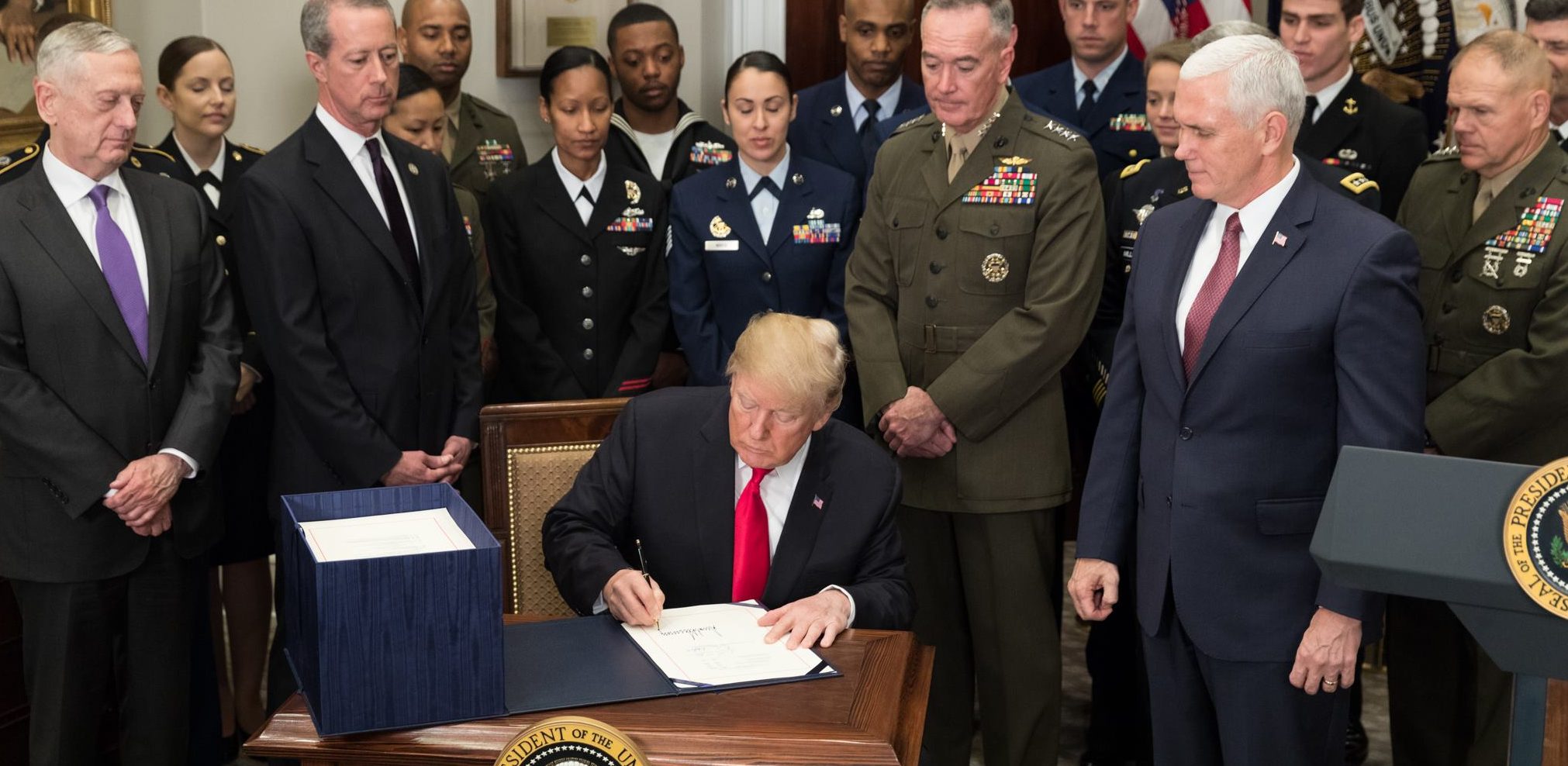
Now we value what we had
Thanassis Cambanis, The Century Foundation
Since the end of the Cold War, liberal internationalists like myself have struggled to convince other Americans, and other liberals around the world, about the importance of multilateral institutions. America has been central to the health and vitality of the international system. At the same time, America has long been the bugbear of humanists everywhere, and not without justification.
Heavy-handed American malfeasance has caused real damage—coddling dictators, promoting runaway toxic finance capitalism, and carelessly toppling states and killing innocents with disastrous interventions, such as the 2003 invasion of Iraq.
Yet all those mistakes occurred in a context of international stability. The arc of history really did seem to be bending toward justice. In the years since the Cold War ended in 1991, poverty decreased worldwide and, for a time, so did violent death. America played a key role in this progress, which depended on enduring international cooperation, a long-term emphasis on rights, and an emphasis on the long-term good rather than short-term profit.
Today, America stands emphatically against liberal internationalist values, and leads the spoilers who seek to tear down international agreements or find loopholes that allow for opportunistic, and destructive, short-term profits. It’s easier to tear down the international order than it was to build it, and Trump has only accelerated a poisonous trend that was already underway. If we are to reverse this trend, we need more regulation and taxation of finance and trade; we need more restraint in arms sales and military interventions; and we need more international collaboration on governance, human rights, and poverty eradication—not more nationalism.
As Trump guts whatever he can (such as the Paris Agreement on climate change) and undermines entire institutions (such as the United Nations), we appreciate anew how much work has gone into making the world’s water cleaner, its air less polluted, and widespread war more limited. Going forward, perhaps we can make a better case for internationalism. Otherwise, we risk replaying the world wars and other calamities of the first half of the twentieth century.
